

Meet Kepler-186f, the most 'Earth-like' planet ever found - Los Angeles Times. Sifting through observations from tens of thousands of distant stars, astronomers say they have discovered the first definitive Earth-sized planet that orbits in a habitable zone where water could exist in liquid form — a necessary condition for life as we know it.
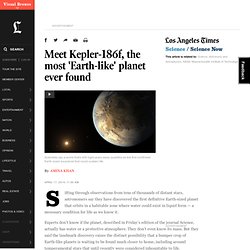
Experts don’t know if the planet, described in Friday’s edition of the journal Science, actually has water or a protective atmosphere. They don’t even know its mass. But they said the landmark discovery raises the distinct possibility that a bumper crop of Earth-like planets is waiting to be found much closer to home, including around temperamental stars that until recently were considered inhospitable to life. “This is really a tip-of-the-iceberg discovery,” said study co-author Jason Rowe, an astronomer at the SETI Institute in Mountain View, Calif., who spent a year analyzing data gathered by NASA’s Kepler Space Telescope. Scientists who were not involved in the paper lauded the find. FAIR Canada » BC’s Mandatory Financial Life Skills Course. Patricia Bowles is the Director of Communications and Education at the British Columbia Securities Commission In 2002, BC’s Ministry of Education revamped its entire public school curriculum, which included designating financial skill instruction as a mandatory subject for more than 55,000 Grade 10 students each year.
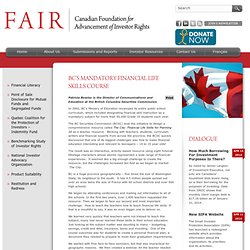
The BC Securities Commission (BCSC) took the initiative to design a comprehensive resource called The City: Financial Life Skills for Planning 10 as a teacher resource. Working with teachers, students, curriculum writers and financial experts from across the province, the BCSC quickly discovered that one of its biggest challenges was how to make financial education interesting and relevant to teenagers – 14 to 15 year olds! The result was an interactive, activity-based resource using eight fictional lifestage characters whose stories represented a wide range of financial experiences. Money Savvy Generation. HawkENtrepreneurship » How To . . . HawkENtrepreneurship » Business Model Design Process. Thank you, Alex Osterwalder author of Business Model Generation.
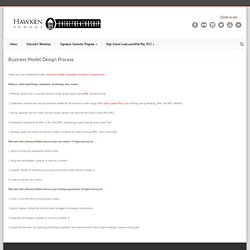
Available at Amazon here. Mobilize, Understand Design, Implement, and Manage. Your venture. 1. Mobilize: prepare for a successful business model design project using BMC and storytelling 2. 3. 4. 5. Why work with a Business Model Canvas in your new venture? 1. satisfy existing but unanswered market needs; 2. bring new technologies, products, or services to market; 3. improve, disrupt, or transform an existing market with a better business model, or 4. create an entirely new market Why work with a Business Model Canvas in your existing organization?
1. solve a crisis with the existing business model; 2. adjust, improve, defend the existing model to adapt to a changing environment; 3. bring new technologies, products or services to market, or 4. prepare for the future by exploring and testing completely new busienss models thrat might eventually replace existing ones. HawkENtrepreneurship. Transforming Curriculum & Assessment. Beyond the Lemonade Stand: How to Teach High School Students Lean Startups. While the Lean LaunchPad class has been adopted by Universities and the National Science Foundation, the question we get is, “Can students in K-12 handle an experiential entrepreneurship class?” Hawken School has now given us an answer. Their seniors just completed the school’s first-ever 3-credit semester program in evidence-based entrepreneurship. Students are fully immersed in real-world learning during the 12-week Entrepreneurial Studies course. Here’s what Doris Korda Associate Head of School and Tim Desmond, Assistant Director of Entrepreneurial Studies did, and how they did it.
Teaching students to think like entrepreneurs not accountantsWe realized that past K-12 Entrepreneurial classes taught students “the lemonade stand” version of how to start a company: 1) come up with an idea, 2) execute the idea, 3) do the accounting (revenue, costs, etc.). Money Savvy Generation. Www.bcsc.bc.ca/uploadedFiles/news/publications/National_Youth_Survey_Executive_Summary_English-25-10-11.pdf. TeachingKidsBusiness.com. Someone who perceives an opportunity and creates an organization to pursue it or simply someone who is looking to build/develop a company.
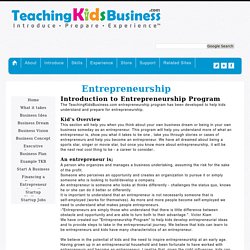
An entrepreneur is someone who looks at thinks differently - challenges the status quo, knows he or she can do it better or differently. It is important to understand that an entrepreneur is not necessarily someone that is self-employed (works for themselves). As more and more people become self-employed we need to understand what makes people entrepreneurs. -"Entrepreneurs are simply those who understand that there is little difference between obstacle and opportunity and are able to turn both to their advantage. ". Victor Kiam We have created our "Entrepreneurship Program" to help kids develop entrepreneurial ideas and to provide steps to take in the entrepreneurial journey.
We believe in the potential of kids and the need to inspire entrepreneurship at an early age. B.C. Students Need a Passport to Financial Literacy. If you’ve been following my blog since I made my final debt repayment last May, you’ve probably seen a post or two here about my thoughts on the current level of personal finance that is weaved into B.C.’s Education IRPs.
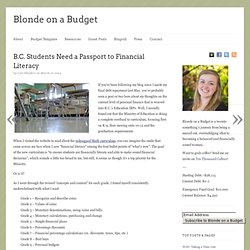
Well, I recently found out that the Ministry of Education is doing a complete overhaul to curriculum, focusing first on K-9, then moving onto 10-12 and the graduation requirements. When I visited the website to read about the redesigned Math curriculum, you can imagine the smile that came across my face when I saw “financial literacy” among the four bullet points of “what’s new”. The goal of the new curriculum is “to ensure students are financially literate and able to make sound financial decisions”, which sounds a little too broad to me, but still, it seems as though it’s a top priority for the Ministry.